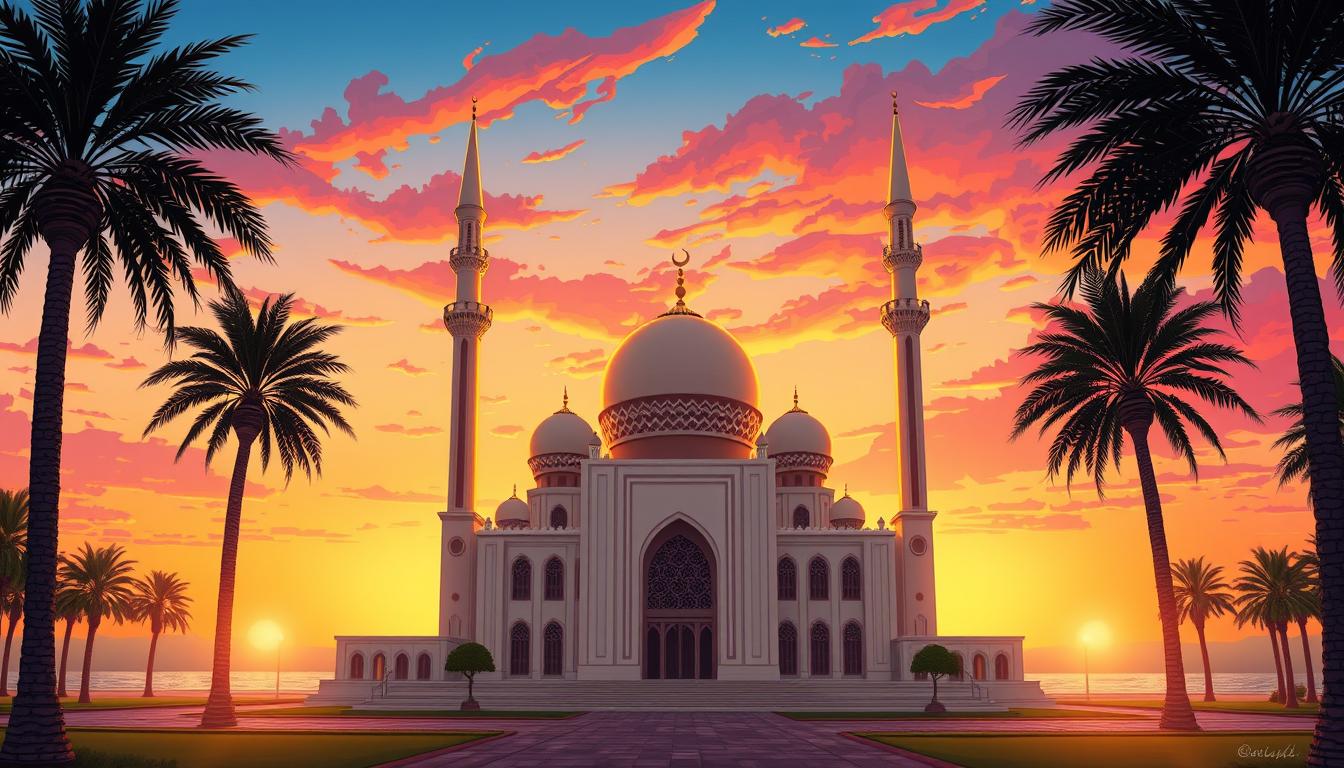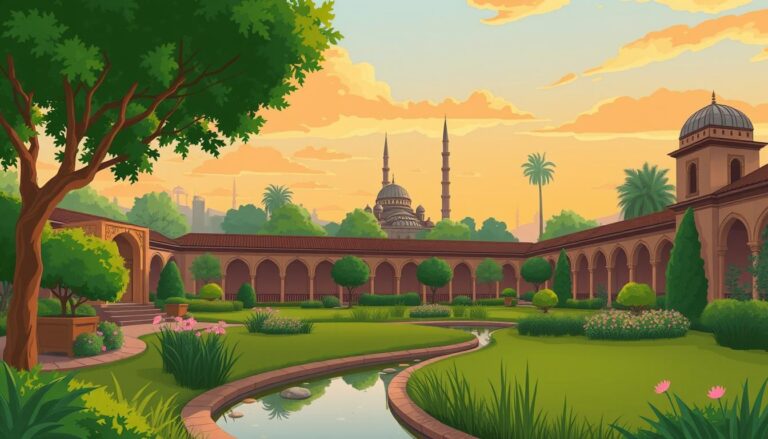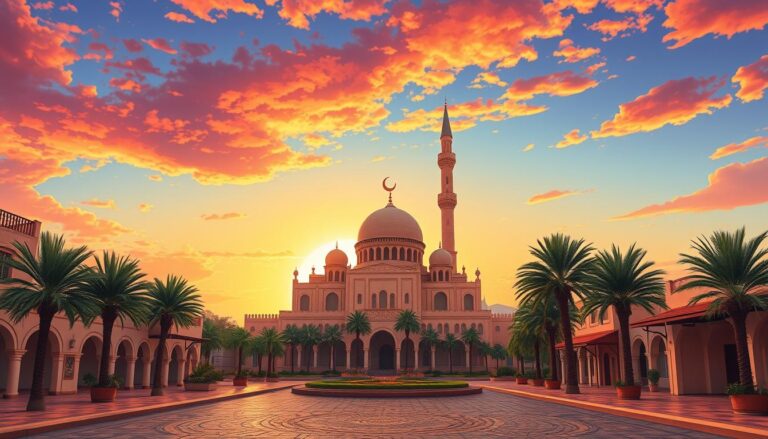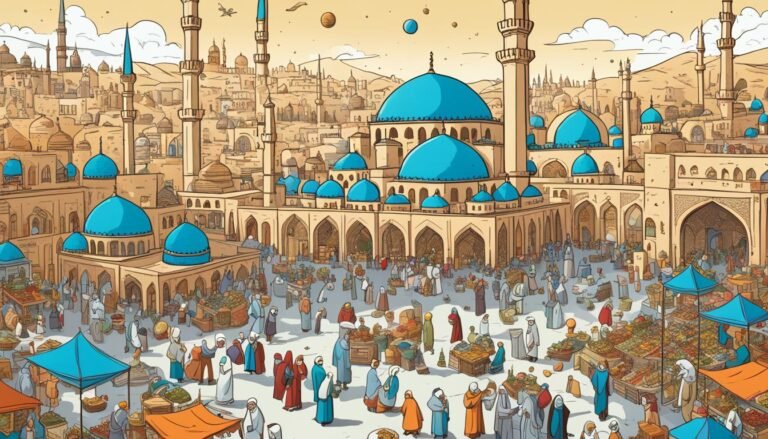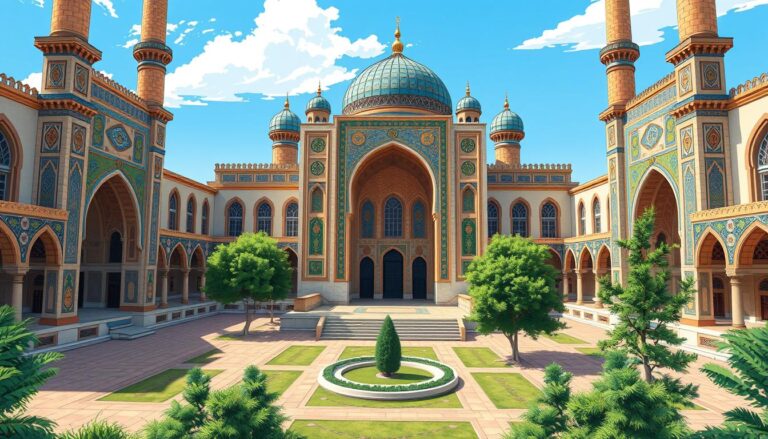Islam in Bahrain
Islam is the main religion in Bahrain, with most people following Sunni or Shia Islam. The country also has smaller groups of Christians, Hindus, Baha’is, and Jews. Bahrain’s Islamic culture shapes many parts of society, including personal habits, social norms, politics, and laws.
About 74% of Bahrain’s people are Muslim, with 99.8% of citizens identifying as such. Bahrain’s Islamic history stretches back centuries, with both Sunni and Shia Islam present. The ruling family and many influential people are Sunni, but Shia Muslims make up a larger part of the Muslim population.
Introduction
Islam has a long history in Bahrain, starting in the 7th century. Muhammad sent his first envoy to the area then. Before Islam, people in Bahrain followed Arabian paganism.
Both Sunni and Shia Islam grew in Bahrain. Over time, Shia Islam became the majority.
It’s important to understand Islam in Bahrain to know the country’s culture and politics. With about 1.6 million people, Bahrain is very diverse. Islam in Bahrain is a big part of this diversity.
Bahrain’s Muslim Population and Denominations
About 99% of Bahrain’s people are Muslim. Most of these Muslims are Shia. But Sunni Islam is also a big part of Bahrain.
- The exact Shia to Sunni ratio is not known. But Shiites are thought to be the majority.
- The other 1% includes Christians, Hindus, Baha’is, and Jews.
Bahrain also has a big expatriate population. This group makes up half of the country’s people. They come from many religions, including Islam, Hinduism, Buddhism, Christianity, Baha’i, and Sikhism.
“Islam has been an integral part of Bahrain’s identity for centuries, shaping the country’s cultural, social, and political fabric.”
Historical Roots of Islam in Bahrain
The history of Islam in Bahrain began in the 7th century AD. Before Islam, people in Bahrain and Qatar followed traditional Arabian paganism. But everything changed when the Prophet Muhammad sent Al-Ala’a Al-Hadrami to Munzir ibn Sawa Al Tamimi, the ruler of Bahrain.
Munzir then converted to Islam, marking a big change in the region’s faith. This event was a turning point for Bahrain’s religious history.
The Shia Islam in Bahrain started with Ali ibn Abi Talib’s caliphate from 656–661 AD. During this time, the Ismaili Shia sect, known as the Qarmatians, took control of Bahrain. They made it their base for over four hundred years.
Later, Sunni rulers helped the Twelver branch of Shia Islam grow in Bahrain. This quietist branch of Shia Islam became a significant part of Bahrain’s religious scene.
“Bahrain was a central site of the ancient Dilmun civilization, dating back to the end of the fourth millennium BC.”
Bahrain’s location on the Persian Gulf trade routes was crucial for its Islamic history. It was under Persian rule from the 6th century BC to the 3rd century BC. Then, the Parthians and Sassanids ruled until Islam arrived in the 7th century AD.
During this time, Bahrain was a key trade hub. Goods like timber, precious woods, ivory, lapis lazuli, gold, and pearls were traded with the Indus Valley and Mesopotamia.
The role of Bahrain in the growth of Shia Islam and the presence of the Qarmatians have deeply influenced its Islamic history. These connections continue to shape Bahrain’s religious and cultural identity today.
Sunni and Shia Denominations
Bahrain’s Muslim population is split between Sunni and Shia, with Shia being the majority. The ruling family and many wealthy, influential Bahrainis are Sunni. This has led to political and social tensions. A recent poll shows the Shia to Sunni ratio among Bahrain’s citizens is 62% Shia and 38% Sunni.
Sunni Islam in Bahrain
Sunnis are the majority in over forty countries, from Morocco to Indonesia. They make up around 85 percent of the world’s 1.6 billion Muslims. In Bahrain, the Sunni population is growing. This is due to more Sunni migrants and young people.
Shia Islam in Bahrain
Shia Muslims believe in the return of the twelfth Imam at the end of time. Their identity is rooted in victimhood over the killing of Husayn, Prophet Mohammed’s grandson. Shia Muslims are a majority in countries like Iran, Iraq, Azerbaijan, and Bahrain.
The percentage of Shia and Sunni populations in specific countries can impact political dynamics and regional tensions.
Only 15% of both Sunni and Shia in Bahrain express a favorable view of American Mideast policy; however, approximately 50% in both communities say it is important for Bahrain to have good relations with the United States.
Islam in Bahrain
Demographics and Population Statistics
Bahrain is a country where Islam has a big impact on its culture and society. The 2010 census showed that 99.8% of Bahrainis were Muslim. But, when including non-nationals, this number drops to 70.2%.
The country’s Muslims are almost evenly split between Sunni and Shia. The 1941 census found Shia Muslims made up 52% of Muslims, with Sunnis at 48%. By the 1980s, unofficial numbers said Sunnis were 45% and Shias 55%.
But, the 2011 official document showed a change. Sunnis now make up 51% of citizens, and Shias are 49%.
The Muslim population in Bahrain is diverse, with Sunni Muslims in Bahrain and Shia Muslims in Bahrain. This diversity has greatly influenced Bahrain’s culture, society, and politics.
“Bahrain’s religious diversity is a testament to its rich history and the coexistence of various Islamic traditions within the country.”
Islamic Culture and Traditions
Bahrain is deeply rooted in Islamic faith, celebrating its rich heritage through festivals and traditions. The country honors major Muslim feasts like Eid al-Adha, Eid al-Fitr, and Prophet Muhammad’s birthday (Mawlid). These are national holidays, showing Islam’s big impact on Bahrain’s culture and daily life.
Celebrations and Festivals
Bahrain also celebrates various Muslim festivities all year. The Garqee’an event, held twice a year, is a special tradition. Kids wear traditional clothes and go around to get nuts and sweets from neighbors. These Eid celebrations in Bahrain and other events bring people together, celebrating their faith and heritage.
The government’s support for these holidays shows how important Islam is in Bahrain. Both Sunni and Shia Muslims come together to celebrate, creating unity and pride in their culture.
“Bahrain’s vibrant Islamic culture and traditions are a testament to the enduring influence of faith in the country’s social fabric.”
Bahraini Mosques and Islamic Architecture
Bahrain, an island nation in the Persian Gulf, is known for its beautiful mosques. These mosques show the country’s rich Islamic architectural heritage. The Khamis Mosque, believed to be the oldest in Bahrain, and the grand Al Fateh Mosque are examples. They are not just places of worship but also symbols of Islamic design traditions.
The Khamis Mosque, from the 8th century AD, is Bahrain’s first mosque. Its design, with a rectangular layout and a central courtyard, reflects early Islamic architecture. On the other hand, the Al Fateh Grand Mosque, built in 1988, is the largest mosque in Bahrain. It can hold up to 7,000 people and features elaborate domes and carvings.
Other notable mosques in Bahrain, like the Gudaibiya Mosque and the Adliya Mosque, have unique designs. The Sayyid Hashim al-Tublani Mosque, built in the 12th century, is special because it houses the tomb of a revered Shi’ite scholar. This mosque shows the diversity of Islamic denominations in Bahrain.
The Al Hasan Mosque, completed recently, is a blend of modern and traditional Islamic design. It has 12 domes, two minarets, and the largest mihrab in the country. This mosque shows how Islamic architecture in Bahrain continues to evolve.
Visitors to Bahraini mosques are drawn into their spirituality and culture. They see the rich history and architecture of these sacred spaces. This experience is a deep dive into Bahrain’s Islamic architectural landscape.
“The architecture of Bahraini mosques is a testament to the country’s deep-rooted connection with the Islamic faith and its enduring influence on the nation’s cultural identity.”
Bahrain’s mosques, from the ancient Khamis Mosque to the modern Al Hasan Mosque, are a source of pride. They show Bahrain’s commitment to preserving its rich religious and cultural heritage.
Role of Islam in Education and Society
Islamic Education in Bahrain
In Bahrain, Islamic studies are a must in government schools. This shows how important Islam is in the country’s education and society. The curriculum has been around for decades, based on Sunni theology.
Recently, there were plans to add Shia teachings to the curriculum. But, the government turned down these proposals.
The High Council for Islamic Affairs is key in Bahrain’s religious scene. It oversees clerical appointments in both Sunni and Shia communities. This council makes sure religious leaders teach what the government wants.
This shows how Islam shapes education and society in Bahrain. The strong link between religion and education highlights Islam’s role in Bahraini society.
“Islam plays a pivotal role in Bahrain’s educational system, with religious studies being a mandatory component of the curriculum in government schools. The government’s oversight of religious institutions and teachings reflects the integral nature of Islam in the country’s social fabric.”
Political Landscape and Islamic Influence
The political scene in Bahrain has been greatly influenced by Islam. King Hamad’s “political liberalisation” policy has led to Islamist parties dominating the parliament. Groups like the Salafi Asalah and Al-Menbar Islamic Society show Islam’s growing role in Bahrain’s politics.
Islamic Parties and Movements
The Shia-led Al Wefaq party was set to lead the parliament after the 2006 election. But since 2011, the Shia community has lost all representation. The government has worked hard to reduce the Shia majority and favor the Sunni minority.
Sunni Islamist groups also face challenges. The Bahraini Muslim Brotherhood, founded in 1941, had a political wing until the 2018 elections. The Salafi group, Al-Asala, has gained support from poorer Sunnis and naturalized Bahrainis, teaming up with Al-Menbar to boost Sunni Islamist votes.
The role of Islam in Bahrain’s politics is complex and changing. The government’s efforts to change the demographic balance and suppress Shia voices are major hurdles. These actions threaten the country’s stability and the influence of Islamic parties.
“The regime in Bahrain actively promoted Sunni Islamist groups as a base of support during the Arab Spring protests, leading to the creation of the National Unity Gathering (NUG) in February 2011 as an alternative Islamist forum advocating for gradual political reforms.”
Challenges and Controversies
Sectarian Tensions and Discrimination
The Sunni and Shia sects’ differences have caused tension in Bahrain. The government has a strong security presence in Shia villages. They limit Shia movements and sometimes destroy their homes.
There’s also a history of Shia Muslims being left out of the military and security jobs. The government has tried to change the country’s demographics. They’ve recruited more Sunni foreigners for security roles, making Shia Muslims feel discriminated against.
“Bahrain’s human rights situation has been classified as ‘dismal’ and worsened in the latter half of 2010 by Human Rights Watch.”
The Bahrain Independent Commission of Inquiry found evidence of abuse in 2011. It showed physical and psychological mistreatment of detainees. Torture in Bahrain is still a big problem, with many saying it’s common in legal proceedings.
Stateless people, known as Bedoon, face many challenges in Bahrain. They can’t own property, travel, or get public services. Torture is widespread, with many forced to confess under duress.
Death sentences have skyrocketed in Bahrain, raising concerns about torture and false confessions. There’s also racism against Shia Muslims, especially those of Iranian descent. Baharna Shias face prejudice too.
Three people were sentenced to a year in prison for discussing Islamic theology online. This has divided the Shia community in Bahrain, which is ruled by a Sunni monarchy.
Conclusion
Islam has a long history in Bahrain, with both Sunni and Shia communities. The Shia have always been the majority. But, the government has worked to change this balance, favoring the Sunni minority.
This has led to political and social tensions. The government is accused of unfairly treating Shia citizens. Yet, Islam in Bahrain is deeply rooted in the culture and society. It shapes education, politics, celebrations, and architecture.
The Islamic culture and traditions in Bahrain are rich and varied. Both Shia and Sunni communities add to the country’s vibrant religious scene. Festivals like Eid al-Fitr and Ashura are celebrated with great enthusiasm.
The mosques and Islamic architecture in Bahrain show the lasting impact of Islam in Bahrain.
However, the Sunni-Shia divide in Bahrain remains a worry. There are reports of discrimination, torture, and human rights abuses against Shia. The government’s policy to naturalize Sunni immigrants has made things worse.
This has hurt the unity and harmony in Bahrain. It’s important for Bahrain to uphold equality, justice, and respect for all faiths. This way, Islam in Bahrain can flourish in a peaceful and welcoming environment.
Source Links
- Bahrain – Islam, Shiʿism, Sunnism
- Bahrain – United States Department of State
- Bahrain 411
- Bahrain | History, Flag, Population, Map, Currency, Religion, & Facts
- Full Country Dossier Bahrain 2024…
- Bahrain – Freedom of Thought Report
- History of Bahrain
- Islam’s Sunni‑Shia Divide, Explained | HISTORY
- Sunnis and Shia in Bahrain: New Survey Shows Both Conflict and Consensus
- The Sunni-Shia Divide
- Islamic Affairs
- Bahrain: Shi’a Worshippers Blocked from Attending Friday Prayers
- Islam and Capitalism in the Making of Modern Bahrain
- Bahrain – Culture, Traditions, Heritage
- Culture of Bahrain
- FDRMC – Bahrain
- List of mosques in Bahrain
- About Bahrain – Al Fateh Grand Mosque
- Religion in Bahrain
- Bahrain – United States Department of State
- Islam in Bahrain
- Bahrain – United States Department of State
- Challenges to Sunni Islamism in Bahrain Since 2011
- Human rights in Bahrain
- Bahrain sentences 3 for questioning Islamic teachings
- Bahrain: Tribalism, Sectarianism, and the Challenges of the 21st Century – Manara Magazine
- Conclusion: Bahrain the Aspiring Hegemon in the Infernal Middle East

